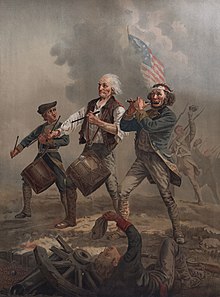
Back وطنيون (الثورة الأميركية) Arabic Patriotlar (Amerika inqilabı) Azerbaijani Patriot (amerikanske revolution) Danish Patrioten (amerikanische Unabhängigkeit) German میهندوست (انقلاب آمریکا) Persian Patriootti (Amerikan vallankumous) Finnish Patriot (révolution américaine) French פטריוטים (המהפכה האמריקנית) HE Patrioti (Američka revolucija) Croatian Patriot (Revolusi Amerika) ID

| Part of a series on |
| Liberalism |
|---|
 |
Patriots, also known as Revolutionaries, Continentals, Rebels, or Whigs, were colonists in the Thirteen Colonies who opposed the Kingdom of Great Britain's control and governance during the colonial era, and supported and helped launch the American Revolution that ultimately established American independence. Patriot politicians led colonial opposition to British policies regarding the American colonies, eventually building support for the adoption of the Declaration of Independence, which was adopted unanimously by the Second Continental Congress on July 4, 1776. After the American Revolutionary War began the year before, in 1775, many patriots assimilated into the Continental Army, which was commanded by George Washington and which secured victory against the British Army, leading the British to acknowledge the sovereign independence of the colonies, reflected in the Treaty of Paris, which led to the establishment of the United States in 1783.
The patriots were inspired by English and American republican ideology that was part of the Age of Enlightenment, and rejected monarchy and aristocracy and supported individual liberty and natural rights and legal rights. Prominent patriot political theorists such as Thomas Jefferson, John Adams, and Thomas Paine spearheaded the American Enlightenment, which was in turn inspired by European thinkers such as Francis Bacon, John Locke, and Jean-Jacques Rousseau. Though slavery existed in all of the Thirteen Colonies prior to the American Revolution, the issue divided patriots, with some supporting its abolition while others espoused proslavery thought.
The patriots included members of every social and ethnic group in the colonies, though support for the patriot cause was strongest in the New England Colonies and weakest in the Southern Colonies. The American Revolution divided the colonial population into three groups: patriots, who supported the end of British rule, loyalists, who supported Britain's continued control over the colonies, and those who remained neutral. African Americans who supported the patriots were known as Black Patriots, with their counterparts on the British side being referred to as Black Loyalists.